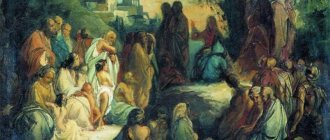People are accustomed to calling the ten basic laws of life “the commandments of Jesus Christ.” In fact, the tablets of instruction, written by God himself, were given to the Jews and other people through the prophet Moses one and a half thousand years before the birth of Christ.
During his earthly life, Jesus Christ preached one God and walked around the world with his disciples. One day, on the top of a mountain, he read the Sermon on the Mount. These were not commandments, but only interpretations of how to fulfill them and live in peace with each other and the Lord in the soul.
The second commandment of God - do not make for yourself an idol: interpretation, brief explanation for adults and children
- You shall not make for yourself an idol or any likeness of anything that is in heaven above, or that is on the earth below, or that is in the water under the earth.
- There is not a single creation that can become for a believer the same power that the Lord is. When you climb a high mountain to meet the Lord, you don’t need to look at the reflection in the river flowing nearby. When presented before the ruler, there is no need to look around at his servants, hoping to hear advice from them or receive help.
- Do we turn to mediators in matters where only those closest to us can help? Will the Father remain indifferent to the experiences and difficulties of his children? With servants it is easier for those who have sin in their souls. But the sinless one does not turn his eyes away from his Father, but boldly looks at the one who is more merciful than the servants.
- The Lord burns away the sins in each of us, just as the sun’s rays have a destructive effect on harmful microbes that appear in water. This purifies the water and makes it suitable for drinking.
- Therefore, the second commandment is the prohibition of idolatry and the creation of idols for veneration. With the second commandment, the Lord prohibits the veneration of the likeness or image of what we observe in the sky (Sun, Moon, stars), and what lives on the earth’s surface (plants, animals, people) or is found in the depths of the sea (fish).
- However, this does not mean that the Lord forbids the veneration of holy icons and relics, because this is only an image, an image of the Lord, angels or saints. Holy images are given to us as a memory of the deeds of God and His saints, to lift our thoughts to God and His saints.
The second commandment of God - do not make for yourself an idol: interpretation, brief explanation for adults and children
Explanation of the second commandment for children:
- It is very difficult for a child to understand what an idol is or why people create idols. It is necessary to find a comparison that is closest and most understandable to the child.
- An idol is what a person mistakenly takes to be the most important and important thing in life. By worshiping idols or idols, a person may even forget about the Lord. But will a child exchange his mother for a doll or his father for a new bicycle? Let's remember the fairy tale about Kai and Gerda. The boy believed that the Snow Queen was his idol, forgetting about simple things - kindness, love. But this did not bring him happiness and the ice castle with perfect, regular cold pears became for him a cage in which his soul perished.
- And only Gerda’s love helped his heart melt and the boy remembered God. Likewise, any Christian should first of all love and remember the Lord, and only then - about loved ones.
“Let your Lord be the only God, Although there are always many different idols in life, Serve only Him with all your soul! Trust in God, not in people!”
Ten Commandments (Ex.34:14-26)
Text from the book of Exodus according to the Synodal translation.
10 And [the Lord] said to Moses: Behold, I make a covenant: before all your people I will do miracles such as have not been done in all the earth or among any people; and all the people among whom you are will see the work of the Lord; for what I will do for you will be terrible;
11 Keep what I command you this day: behold, I am driving out from before you the Amorites, the Canaanites, the Hittites, the Perizzites, the Hivites, the Girgashites, and the Jebusites;
12 Be careful that you do not enter into an alliance with the inhabitants of the land into which you enter, lest they become a snare among you.
13 Destroy their altars, break down their pillars, cut down their sacred groves, [and burn the images of their gods with fire],
14 For you must not worship any god other than the Lord [God], for His name is Jealous; He is a jealous God.
15 Do not enter into an alliance with the inhabitants of the land, lest when they commit fornication after their gods and offer sacrifices to their gods, they invite you too, and you eat their sacrifices;
16 And do not take wives from their daughters for your sons, lest their daughters, having committed harlotry after their gods, cause your sons to commit harlotry after their gods.
17 Do not make for yourselves cast gods.
18 You shall observe the Feast of Unleavened Bread: for seven days you shall eat unleavened bread, as I commanded you, at the appointed time in the month of Abib, for in the month of Abib you came out of Egypt.
19 Everything that opens lies is mine, as are all your male cattle that break lies, oxen and sheep;
20 You shall replace the firstborn of the donkeys with a lamb, and if you cannot replace it, then redeem it; Redeem all the firstborn of your sons; Let them not come before Me empty-handed.
21 Work six days, and rest on the seventh day; rest during sowing and harvest.
22 And you shall celebrate the Feast of Weeks, the Feast of the Firstfruits of the Wheat Harvest, and the Feast of Gathering in at the end of the year;
23 Three times a year all your males shall appear before the Sovereign, the Lord God of Israel,
24 For I will drive out the nations from before you and enlarge your borders, and no one will covet your land if you appear before the Lord your God three times a year.
25 You shall not shed the blood of My sacrifice on leaven, and the sacrifice of the Passover shall not remain overnight until the morning.
26 You shall bring the very first fruits of your land into the house of the Lord your God. Do not boil a kid in its mother's milk.
27 And the Lord said to Moses, Write these words to yourself, for in these words I make a covenant with you and with Israel.
28 And [Moses] remained there with the Lord forty days and forty nights, eating no bread or drinking water; and [Moses] wrote on the tablets the words of the covenant, the ten chapters.
The sixth commandment of God is not to kill: interpretation, brief explanation for adults and children
- The sixth commandment is the prohibition against killing by any means. The prohibition applies both to other people and to oneself (suicide). The most terrible and serious sin is the deprivation of life - the greatest gift of God.
- Suicide is one of the grave sins, in which not only the sin of murder is seen, but despair and daring rebellion against the Providence of the Lord. A suicide will not be able to repent after death and ask for salvation for his soul.
The sixth commandment of God is not to kill: interpretation, brief explanation for adults and children
Explanation of the sixth commandment for children:
- Taking the life of one person by another is the most terrible sin.
- The same sin is to torture animals, birds, insects. All of them are creations of the Lord, which man must take care of.
“It’s not just guns that kill people! And life is shortened. Sometimes it is not guns, but a rude word, a thoughtless act. Life destroys another, whether he is old or young. Take care of people, take care, love, bless everyone and give joy!”
Traditional understanding
In Judaism
Parchment with the text of the Decalogue from the Sephardic synagogue of Esnoga. Amsterdam. 1768 (612×502 mm)
- You shall not take the name of the Lord your God in vain [literally “falsely” - that is, during an oath], for the Lord will not leave without punishment the one who takes His name in vain [falsely].
- Don't kill. In original: " ". The verb used "" denotes immoral premeditated murder (cf. English murder), as opposed to any killing at all, for example, as a result of an accident, in self-defense, during war or by a court order (cf. English kill). (Since the Bible itself prescribes the death penalty by court order for breaking certain commandments, this verb cannot mean murder at all, under any circumstances)
- Thou shalt not commit adultery [in the original, this word usually refers only to sexual relations between a married woman and a man other than her husband]. According to another opinion, this commandment includes all the so-called “prohibitions of incest,” including incest and bestiality.
- Don't steal. The prohibition against theft of property is also set forth in Lev. 19:11. Oral tradition interprets the content of the commandment “Thou shalt not steal” in the Ten Commandments as prohibiting the abduction of a person for the purpose of enslavement. Since the previous commandments “do not kill” and “do not commit adultery” speak of sins punishable by death, one of the principles of interpretation of the Torah prescribes that continuation should be understood as a severely punishable crime.
- “Thou shalt not covet...” This commandment includes the prohibition of theft of property. According to Jewish tradition, theft is also “theft of an image,” that is, the creation of a false idea about an object, event, person (deception, flattery, etc.).
The seventh commandment of God is not to commit adultery: interpretation, brief explanation for adults and children
- Adultery is a violation of marital fidelity. Illegal, impure love is considered sinful. Violation of marital fidelity and love is prohibited by the Lord.
- If a person is not bound by an oath of fidelity to his spouse, then he should adhere to pure thoughts and desires, remain virgin in deeds and words. What does this mean? It is necessary to avoid what gives rise to unclean feelings: swearing, shameless songs, dancing, looking at seductive images, shows, drunkenness.
Explaining the seventh commandment to children:
- A person bound by marriage or an oath of fidelity should not step over love or betray his loved one.
- A family can only be saved if both the man and the woman remain faithful to each other.
“Years will pass. You will grow up. God will give you a spouse. You will love it. You will get married. Always be faithful and devoted to your friend. Work on your relationships. Wait for God's answer. Don't change your love. Don't break your covenant."
The seventh commandment of God is not to commit adultery: interpretation, brief explanation for adults and children
Sayings of the Holy Fathers
This is how St. Ephraim the Syrian spoke about the meaning of the commandments:
If you love the way of righteousness [commandments], you will find Eternal Life.
He who keeps the commandments loves himself, but he who neglects them harms his soul.
He who has acquired the commandments finds God within himself.
Saint John Chrysostom said:
We give a fading orchid a chance: how to grow a new flower from a stump
The craftswoman showed how she uses egg trays (and there’s no shame in giving them as a gift)
Bringing the rose bush back to life after winter: how to properly reanimate flowers
Listen to God in the commandments so that He will hear you in your prayers.
Saint Ignatius Brianchaninov explained:
Fulfillment of the Gospel commandments introduces a person into true knowledge of God and self-knowledge, into true love for oneself, for one’s neighbor, for God and into communion with God.
The eighth commandment of God is not to steal: interpretation, brief explanation for adults and children
- Theft, as well as appropriation in any way of what belongs to another person, is prohibited by the Lord.
- Stealing is considered a bad act. If a person finds an expensive item on the street and takes it for himself, this is also considered theft. It would be better to try to find the person who lost this item. Such an act is a manifestation of loyalty to the holy God.
“The one who took their things from people in a dishonest way, that person became a thief, this will become known to everyone.”
The eighth commandment of God is not to steal: interpretation, brief explanation for adults and children
“To have a chance to win, you need to play by the rules”
Inga Flyazhnikova, journalist, head of the Agency for Investigative Journalism:
“I believe that God’s commandments are the Laws of life, even regardless of religion. And a person who comes into this world must live according to its laws. After all, every game has its own rules, and if you are already forced to play it in order to have a chance to win, you need to play by the rules. For any violation of the Law in the world, appropriate punishment is provided, but even despite this, crime was, is and will be. There is also a punishment for violating God’s commandments, but for many it is completely vague, incomprehensible, and unlimited in time. Only true believers understand its essence. But even they quite often violate God's commandments. Man is imperfect."
The ninth commandment of God is not to lie: interpretation, brief explanation for adults and children
- All lies, untruths, slander are prohibited by the Lord by the tenth commandment. Testifying to a lie during a trial against another person, denunciation, slander, and gossip are unacceptable for a Christian.
- You cannot lie even if you have no intention of harming your neighbor. Because such behavior is not consistent with love and respect for others.
Explaining the Ninth Commandment to Children:
- There are situations when the only way to avoid punishment may be to lie. But this method is just an illusion.
- By following the path of lies, you can overcome certain difficulties, but in the end, circumstances will develop in such a way that the deception will be revealed. You also can’t speak untruths about people.
“Don’t tell lies about people! For this, ask for God’s help, To see the good in your neighbors. Think not evil, but good about them! A lie can bring misfortune, but the truth can lead to your victory.”
The ninth commandment of God is not to lie: interpretation, brief explanation for adults and children
Freedom of love
Fulfilling the commandments is not a forced satisfaction of some external necessity, but a matter of love for God arising from an internal volitional decision. God is love, and he who abides in love abides in God, and God in him (1 John 4:16); If you keep My commandments, you will remain in My love (John 15:10).
When a son tries not to make noise so as not to wake up his father who is tired after work, or when a father in a hungry time gives his dinner to his son, or when a young man buys flowers to give them to his beloved girl, they do so not because they are forced to do so by society. necessity, or duty of following the tradition of ancestors, or even some set of rules perceived by them, but simply out of love.
And in doing so, they are completely free, since they do not act under compulsion; all such actions are free manifestations of love.
So the one who unites with God in love becomes truly free, and doing the commandments is as natural for him as breathing.
It is precisely the lack of understanding of this that largely explains the common stereotype in the minds of unbelievers and non-church people: supposedly “to live according to the commandments is to live unfreely, but to live in sins is freedom.”
When in fact the opposite is true.
Anyone can be convinced of this by looking into themselves. How can evil bring freedom if it leaves your soul so heavy? How can a lie bring freedom if it does not calm the heart that yearns for the truth?
It is said: you will know the truth, and the truth will make you free (John 8:32). I am... the truth - testifies the Lord Jesus Christ (see John 14:6). Knowing Christ and uniting with Him in love gives true freedom to the glory of the children of God (Rom. 8:21). As the Apostle Paul says, everything is permissible for me, but not everything is beneficial; everything is permissible for me, but nothing should possess me (1 Cor. 6:12).
|
The tenth commandment of God is not to envy: interpretation, brief explanation for adults and children
- The Lord does not allow others to do something bad, and also forbids bad desires and thoughts towards others or loved ones. The tenth commandment speaks of the sin of envy.
- Anyone who mentally desires something else can easily cross the line separating bad thoughts and bad deeds. The very feeling of envy already defiles the soul.
- She becomes unclean before the Lord, because sin came into the world through devilish envy. A true Christian must cleanse his soul from internal impurities, guard against bad desires and remain grateful to God for what he has. If a friend or neighbor has a lot of everything, then you need to be happy for him.
Explaining the Tenth Commandment to Children:
- With the Tenth Commandment, God forbids people to envy. After all, this feeling prevents them from living joyfully: among loved ones and neighbors, among acquaintances, there will always be someone whose life may seem better than their own.
- But there are many examples in fairy tales that you cannot be greedy and always want more than you have. For example, the greedy old woman from Pushkin’s fairy tale “The Golden Fish”. If something very good happens to your friends, then it is better to be sincerely happy for them and thank the Lord for it.
“Do not covet anything that your neighbor owns. Don’t dream that someone has an extra item. These thoughts will bring you suffering, because you will bring punishment to yourself for sin.”
The Seven Deadly Sins Explained
Having understood what each of the 7 deadly sins represents, a Christian will see the full horror of vices. Each of the sins leads to consequences that are incompatible with the Divine way of life. These are not rules, like commandments, but laws, prohibitions. To violate mortal sins is to knowingly commit the most serious crime against the Lord.
The laws of God are simple to fulfill for righteous people who care about the soul
Self-love
If a person loves himself more than anyone else, he moves away from his family, friends and the Lord himself. The devil sees that the sinner is happy in himself and constantly tempts the soul of a person, giving him new reasons for pride and narcissism. In the end, the sinner is left with himself, he no longer sees his loved ones, friends, and he is overwhelmed by a thirst for even greater elevation. Such a person loses the ability to love, does not value friendship, becomes rude and hardens in soul.
Only the virtue of patience can curb self-love.
Greed
The desire to possess much and more can paralyze the soul. The sin of greed is the scourge of the modern world, where all goals are aimed at obtaining money and wealth. No wonder they say: “the more money, the shallower the soul.” In pursuit of material values, people forget about spiritual wealth. But there are still rich and generous Christians, because only generosity coming from the heart can curb the sin of greed.
Fornication
Fornication can be physical and mental. The first includes voluptuousness, the desire to possess many partners, and infidelity. Dirty thoughts about satisfying lust do not give the opportunity to think about what a person is doing and why he needs it. The state of fornication is compared to the vicious state of animals during the breeding season. But man is created in the image and likeness of God, he is obliged to resist sin, maintain purity of body and thoughts, and possess the virtue of abstinence.
The mortal sin of fornication drives people into a frenzy, such vicious acts and thoughts that any normal person would seem criminal in their essence
.
Jealousy
The sin of jealousy originates from pride and envy. The destructive passion of jealousy must be eradicated from Christians at the thought stage. Jealousy can be not only towards a spouse, but also towards people who have something special. Jealousy of beauty leads to murder, and jealousy of one’s spouse – to angry scandals. There are plenty of examples in worldly life when, because of jealousy, people were maimed, killed, infected with terrible diseases, and did many other things that were contrary to human nature itself. In order not to be jealous, you need to love God, people and learn to trust them.
Gluttony
In modern life, the sin of gluttony comes in second place after greed. Gluttony, drinking alcoholic beverages for the sake of pleasure alone, and not to quench thirst or hunger, is a mortal sin. The passion for gluttony overshadows reason, and people shell out huge sums of money to try an unknown delicacy or drink. Moreover, gluttony pushes to murder, adultery, and drives the layman into greed and anger. To resist gluttony, you need moderation in food and drink.
Anger
In the Christian religion, an angry state is often called frenzy. Anger and anger destroy the soul, fill it with confusion, anxiety, and even drive it to real rage (frenzy). Constant displeasure or a temporary fall into an angry rampage is the cause of murder, causing severe damage to the body and soul. In anger, a person can do things that he cannot even imagine in a calm state. Only kindness can resist anger; it fills the soul with joy and brings us closer to God.









